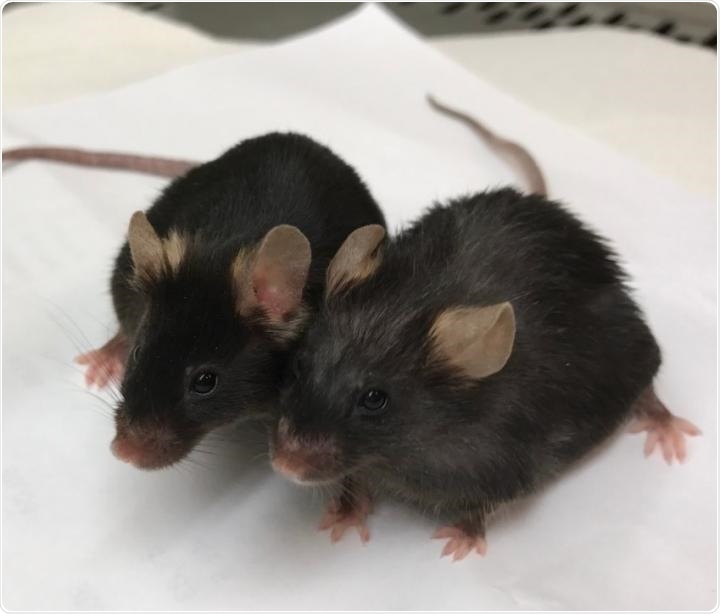According to results from a double-blinded study, middle-aged mice had a better “old age” when the naturally-occurring metabolite, called alpha-ketaglutarate (AKG), was added to their food.

Age-matched control and AKG-fed female mouse (on the left). Animals are 28 months old in the captured picture and the AKG mouse received AKG for 10 months. Image Credit: Azar Asadi Shahmirzadi.
As the mice became older, they were healthier and experienced a drastically shorter time of disability and disease before they died—a first-of-its-kind study involving mammals.
Published in the Cell Metabolism journal, the study results were built on clinically-relevant markers of healthspan.
Earlier research works demonstrated that blood plasma levels of AKG can reduce up to 10 times as people age. Exercise and fasting, already demonstrated to promote longevity, boost the synthesis of AKG. Since AKG is not present in the normal diet, supplementation is the only viable method to restore its levels.
The standard for efficacy in research on aging is whether interventions actually improve healthspan. We’ve reached that mark here with a compound that is naturally produced by the body and is generally shown to be safe.”
Gordon Lithgow, PhD, Study Senior Author and Professor, Buck Institute for Research on Aging
Considering that a few mice did experience moderate lifespan extension (the average was about 12%), healthspan measures increased by over 40%. Lithgow stated that the aim is invariably to compress the time of frailty and disease.
The nightmare scenario has always been life extension with no reduction in disability. In this study, the treated middle-aged mice got healthier over time. Even the mice that died early saw improvements in their health, which was really surprising and encouraging.”
Gordon Lithgow, PhD, Study Senior Author and Professor, Buck Institute for Research on Aging
AKG plays a key role in several underlying physiological processes. For example, it contributes to metabolism, supplying energy to cellular processes. It helps activate protein and collagen production and affects age-related processes such as stem cell proliferation. AKG also blocks the breakdown of protein in muscles, rendering it a well-known supplement among athletes. It is even used for treating kidney diseases and osteoporosis.
The mice that were fed AKG showed a decrease in levels of systemic inflammatory cytokines. Treatment with AKG promoted the production of Interleukin 10 (IL-10) which has anti-inflammatory properties and helps maintain normal tissue homeostasis.”
Azar Asadi Shahmirzadi, Pharm.D, PhD, Study Lead Scientist and Postdoctoral Fellow, Buck Institute for Research on Aging
Shahmirzadi continued, “Chronic inflammation is a huge driver of aging. We think suppression of inflammation could be the basis for the extension of lifespan and probably healthspan, and are looking forward to more follow up in this regard. We observed no significant adverse effects upon chronic administration of the metabolite, which is very important.”
According to Asadi, several study findings were specific to sex, with female mice usually faring better than males. Coat condition and fur color were considerably enhanced in the treated females; the animals also had improved kyphosis, a curvature of the spine usually seen in aging, and gait. Piloerection was also improved in the females; it involves involuntary contraction of tiny muscles located at the base of hair follicles.
Asadi added, “That measure relates to pain and how uncomfortable the animal is. The treated animals showed an extended ability to groom themselves.”
AKG-treated male mice were better able to sustain muscle mass as they age. They also had improved grip strength and gait, less kyphosis, and exhibited better eye health and fewer tumors, added Asadi.
According to scientists, the consistent longevity effects of AKG in yeast, C. elegans, and recently in mice demonstrate that the metabolite is influencing an evolutionary conserved aging mechanism that might be translational to humans. AKG clinical trial involving people aged 45 to 65 years is being scheduled at the Centre for Healthy Longevity at the National University of Singapore (NUS).
Brian Kennedy, PhD, a professor from Buck Institute for Research on Aging, stated, “This trial will look at the epigenetic clock as well as standard markers of aging, including pulse wave velocity, and inflammation among others. This opportunity will allow us to go beyond anecdotal evidence. Real clinical data will help inform physicians and consumers eager to improve health within the context of aging.”
Kennedy is also the Director of the Centre at NUS and the senior co-author of the study.
Lithgow added that the fundamental research in the nematode worm C. elegans initiated AKG’s journey to human clinical trials, observing that the first proof that AKG extended lifespan in the tiny worm emerged in 2014.
“We tested AKG in distinct strains of the worm in 2017 and determined that treatment hit conserved aging pathways in the animals. The fact that it is poised to be rigorously tested in humans just a few years later shows how quickly research can move from the lab bench to the clinic. Never underestimate the knowledge that comes from studying this tiny worm,” Lithgow concluded.
Source:
Journal reference:
Shahmirzadi, A. A., et al. (2020) Alpha-ketoglutarate, an endogenous metabolite, extends lifespan and compresses morbidity in aging mice. Cell Metabolism. doi.org/10.1016/j.cmet.2020.08.004.